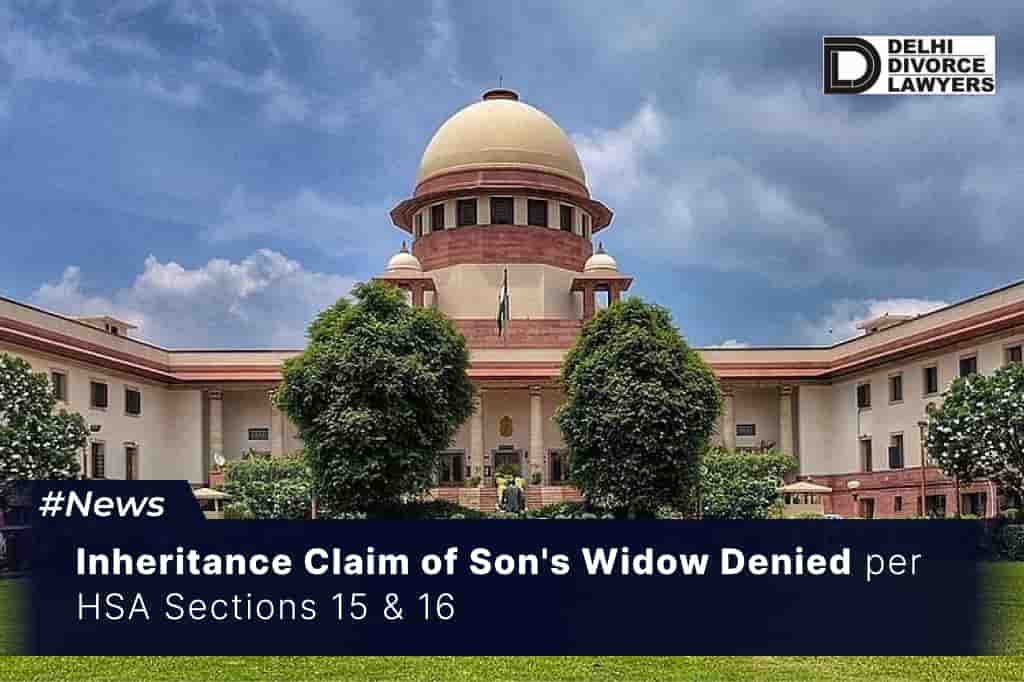The declarative stance articulated by the Supreme Court elucidates that, in accordance with the stipulations set forth in Sections 15 and 16 of the Hindu Succession Act (HSA), the widow of a deceased son does not inherently accrue an immediate entitlement to assert a proprietary interest in the joint family property earmarked for the mother-in-law. This judicial resolution emanates from an appellate litigation challenging the precedent adjudication of a High Court. Within the antecedent legal contest, the pivotal contention revolved around the eligibility of the surviving spouse of the deceased son to a specific aliquot, precisely quantified as 1/7th, derived from the mother-in-law’s distributive interests of 1/8th and 1/16th in the subject immovable assets.
“A combined reading of Section 15(1)(a) and Section 16 of the Act would make it manifest that the property of a female Hindu dying intestate shall devolve, firstly, upon the sons and daughters (including the children of any pre-deceased son or daughter) and the husband. Therefore, the plaintiff being the widow of the pre-deceased son does not have the first right or entitlement to receive any share in the share of her mother-in-law”, the Bench comprising Justice B.R. Gavai, Justice Hima Kohli and Justice Prashant Kumar Mishra held.
Counsel Balaji Srinivasan appeared as legal representation for the Appellant, Sachidhanandam, while Counsel K Krishna Kumar served as counsel for the Respondent, Vanaja. The litigation in question pertains to the estate of Nallathambi Chittiar, the progenitor of Elango, with Elango, having contracted matrimony with Vanaja, assuming the role of the Plaintiff in the Original Suit. The legal contest involves Nallathambi Chettiar’s widow (hereinafter referred to as the Plaintiff’s Mother-in-law) and her progeny, specifically Sachidhanandam, designated as the Second Defendant. In the initial adjudication of Vanaja’s suit for partition, the Trial Court adjudged her entitled to a 1/8th share in the properties outlined in Schedule B, C, and C1.
Conversely, the First Appellate Court favored Sachidhanandam, determining the entitlement of the Plaintiff’s Mother-in-law to a 1/16th share in the specified Schedule B and C1 properties. Furthermore, the Court accorded Vanaja the procedural avenue to seek redress under Order XX Rule 12 of the Civil Procedure Code (CPC) pertaining to mesne profits associated with Schedule C1 and B. Subsequent to further appeal, the High Court affirmed Vanaja’s entitlement to a 1/7th share, computed from the share of her mother-in-law in the Schedule B, C, and C1 properties. Dissatisfied with this adjudication, Sachidhanandam pursued legal recourse before the Supreme Court.
The Supreme Court expounded that the intestate succession of a deceased Hindu female’s estate is statutorily governed by Sections 15 and 16 of the Hindu Succession Act (HSA). These statutory provisions delineate the hierarchical sequence for the devolution of property rights among the legal heirs.
“Sections 15 and 16 of the Act provide that the property of a female Hindu dying intestate shall devolve according to the rules set out in Section 16. Section 15(1)(a) provides that such devolution shall be firstly, upon the sons and daughters (including the children of any pre-deceased son or daughter) and the husband. The rule for distribution of the intestate property of a female Hindu and order of succession is provided under Section 16 of the Act according to which, the order of succession among the heirs of a female Hindu referred to in Section 15 shall be firstly, as per rule 1 thereof, among the heirs specified in sub-section (1) of Section 15 of the Act”, the Bench noted.
The court concurred with the High Court’s adjudication, affirming the communal character of the contested properties. Nonetheless, a procedural lapse was discerned in the application of Sections 15 and 16, specifically pertaining to the allocation of a 1/7th share derived from the 1/8th and 1/16th proportions of the mother-in-law’s entitlement. Consequently, in the exercise of its appellate jurisdiction, the court allowed the appeal and nullified the impugned judgment.

